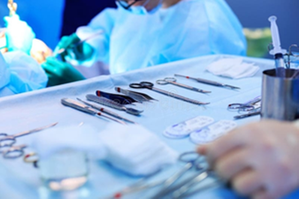Faridabad: Doctors saved a five-year-old Rajasthani girl suffering from severe congenital scoliosis — a spinal deformity by birth — with a lifesaving and complex spine surgery.
Affecting about one in 10,000 newborns, congenital scoliosis occurs when the vertebrae do not form normally before a baby is born.
The child, the daughter of a cloth dealer from Rajasthan’s Kothputli, was facing extreme pain and significant risks to her heart and lung development due to her spinal deformity, making the surgery urgent and indispensable.
A normal spine appears straight when viewed from the front or back, but in scoliosis, it curves in a C or S shape. Severe scoliosis, with curves exceeding 60 degrees, can pressure the heart and lungs, particularly in growing children.
The patient first started displaying signs of spine deformity when she was around three years of age. This started increasing rapidly as she grew.
She also started developing severe pain on one side of her waist as her rib cage had started digging into her pelvic bone because of a spinal curve.
Additionally, she started developing shortness of breath after normal work and play, possibly because of compression of the lungs on one side of the spinal curve.
“The girl’s scoliosis curve was around 90 degrees at admission and was increasing rapidly as seen in serial X-rays,” said Tarun Suri, Senior Consultant and HoD, Spine Surgery, Amrita Hospital, Faridabad.
“She had also developed severe costo-pelvic impingement, a condition in which a patient’s rib cage starts digging into the pelvic bone and causes severe pain; the space available for left lung and heart had also decreased considerably due to severe scoliosis, making this surgery so vital,” Suri added.
The doctors opted for advanced intraoperative neuromonitoring (IONM) technology, in which the function of the spinal cord is continuously monitored throughout the surgery.
“Since the patient was only five years old at the time of surgery, extensive fusion of the thoracic spine was not possible as it would impede the growth of her thoracic cavity, crucial for lung development. Therefore, she underwent growing rod surgery, where screws are placed at the top and bottom of the spine, connected by rods that are lengthened every six months to accommodate spinal growth until she is about 10 years old. At that point, definitive fusion surgery can be performed,” Suri said.
The girl recovered very fast after the six-hour-long surgery.
A brace was made for her to support the spine and she was made to walk two days after the surgery. She had a good correction of the curvature of her spine and the pain was also reduced. Postoperative X-rays showed good correction, said the doctor.
–IANS


Comments are closed.